Related Research Articles
The Tzadikim Nistarim or Lamed Vav Tzadikim, often abbreviated to Lamed Vav(niks),[a] refers to 36 righteous people, a notion rooted within the mystical dimensions of Judaism. The singular form is Tzadik Nistar.
Yiddish theatre consists of plays written and performed primarily by Jews in Yiddish, the language of the Central European Ashkenazi Jewish community. The range of Yiddish theatre is broad: operetta, musical comedy, and satiric or nostalgic revues; melodrama; naturalist drama; expressionist and modernist plays. At its height, its geographical scope was comparably broad: from the late 19th century until just before World War II, professional Yiddish theatre could be found throughout the heavily Jewish areas of Eastern and East Central Europe, but also in Berlin, London, Paris, Buenos Aires and New York City.
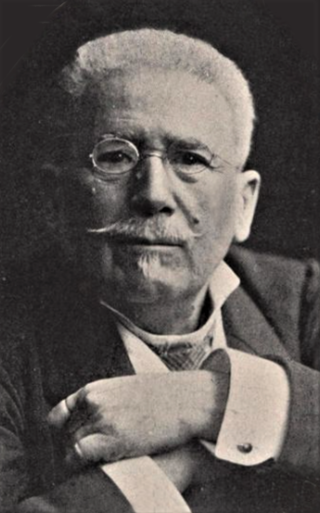
Abraham Goldfaden, also known as Avram Goldfaden, was a Russian-born Jewish poet, playwright, stage director and actor in Yiddish and Hebrew languages and author of some 40 plays. Goldfaden is considered the father of modern Jewish theatre.
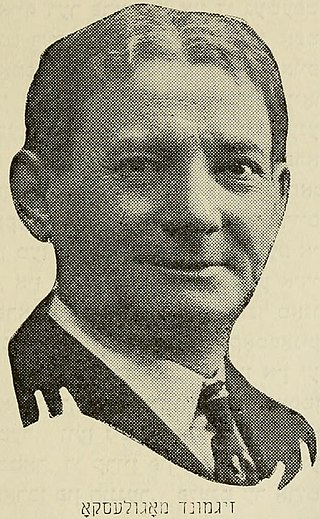
Sigmund Mogulesko — Yiddish: זעליק מאָגולעסקאָZelik Mogulesko, first name also sometimes spelled as Zigmund, Siegmund, Zelig, or Selig, last name sometimes spelled Mogulescu — was a singer, actor, and composer in the Yiddish theater in New York City. He was born in Kalarash, Bessarabia and began singing in the local synagogue choir. Before reaching adolescence, he was paid nearly three times what teachers made, to sing in the synagogue of Chişinău. Soon after moving to Bucharest, Romania, he was paid to sing in churches as well as synagogues, and started acting.
Joseph Lateiner was a playwright in the early years of Yiddish theater, first in Bucharest, Romania and later in New York City, where he was a co-founder in 1903 with Sophia Karp of the Grand Theater, New York's first purpose-built Yiddish language theater building.

Jacob Michailovitch Gordin was a Russian-American playwright active in the early years of Yiddish theater. He is known for introducing realism and naturalism into Yiddish theater.
Joseph Green, born Yoysef Grinberg, a.k.a. Josef Grünberg, Joseph Greenberg and Joseph Greene, a Polish-born Jew who emigrated to the United States in 1924, was an actor in Yiddish theater and one of the few directors of Yiddish-language films. He made four Yiddish films that he shot on location in Poland, beginning in 1935: Yidl mitn fidl, Der Purimspiler, Mamele, and A brivele der mamen. He also wrote the screenplays for the films, except for Mamele.
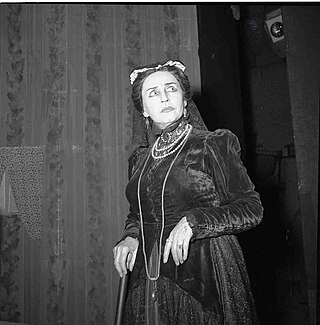
Mirele Efros was an 1898 Yiddish play by Jacob Gordin. Some have called it "the Jewish Queen Lear".
Leon Kobrin was a playwright in Yiddish theater, writer of short stories and novels, and a translator. As a playwright he is generally seen as a disciple of Jacob Gordin, but his mature work was more character-driven, more open and realistic in its presentation of human sexual desire, and less polemical than Gordin's. Many of his plays were "ghetto dramas" dealing with issues of tradition and assimilation and with generational issues between Jewish immigrants to America and the first generation of American-born Jews.

Zalmon Libin, usually known as Z. Libin, was a writer of short stories and a playwright in Yiddish theater, active around 1900.

Pesach "Peishachke" Burstein was a Polish-born American comedian, singer, coupletist, and director of Yiddish vaudeville/theater. He was honored with the Itzik Manger Prize in 1986. His wife Lillian Lux, and son Mike Burstyn are also actors.

The Flying Matchmaker is a 1966 Israeli film musical directed by Israel Becker. The film was the first major success on screen for lead actor Mike Burstyn who has a double role as Kuni Leml and his cousin Max, and also casts his father Pesach Burstein in a small role. The film was selected as the Israeli entry for the Best Foreign Language Film at the 39th Academy Awards, but was not accepted as a nominee.
Gerald Alan Freedman was an American theatre director, librettist, and lyricist, and a college dean.
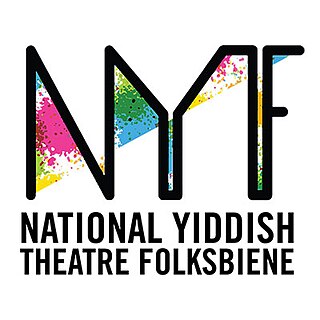
The National Yiddish Theatre Folksbiene, commonly known as NYTF, is a professional theater company in New York City which produces both Yiddish plays and plays translated into Yiddish, in a theater equipped with simultaneous superscript translation into English. The company's leadership consists of executive director Dominick Balletta and artistic director Zalmen Mlotek. The board is co-chaired by Sandra Cahn and Carol Levin.

Clifford David was an American actor, singer, and coach. His career began in the 1950s, with early live television appearances leading to roles in Broadway musicals. He also played character roles in television series, feature films, and theatre.

Couplets were wittily ambiguous, political, or satirical songs in an number of European countries, usually performed in cabaret settings, usually with refrains, often used as a transition between two cabaret numbers. Couplets could also be independent stage numbers. A coupletist is a poet, singer, or actor who specializes in couplets.
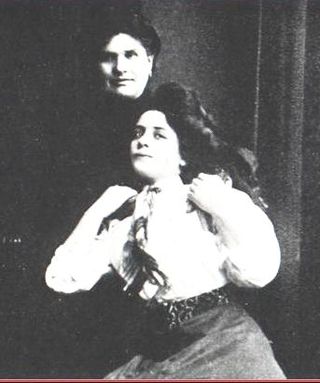
Clara Young was a Yiddish theatrical actor. Born to parents who loved the stage, she spent her early years in a home that housed rehearsals of traveling Yiddish theater troupes. After her father's death, the family went to America, where she soon joined the Tantsman company and went to Boston, there to Zolotarevski's troupe in Montreal, thence to Toronto and to Morris Finkel's theater in Philadelphia.

Osip Dymov was the pseudonym for Yosif (Osip) Isidorovich Perelman (1878–1959), a Russian writer. His brother was popular-science writer Yakov Perelman.

Jacob Ben-Ami was a noted Belarusian-born Jewish stage actor who performed equally well in Yiddish and English.

Pepi Litman was a cross-dressing female Yiddish vaudeville singer associated with the Broderzinger movement. Litman led a popular traveling theater troupe around Europe, performing highly satirical songs while costumed as a male Hasidic Jew. Because she frequently performed while costumed as a young boy or as a male dandy, she is considered a proto-drag king performer. Pepi Litman made numerous 78rpm recordings which capture her energetic and virtuosic singing style, and which also stand as a document of Jewish life in Eastern Europe.
References
- 1 2 Freedman, Samuel G. (December 3, 1984). "A Goldfadn Hit of 1880 Is Reborn Off Broadway". New York Times. Retrieved 2016-12-28.
- 1 2 3 "Nahma Sandrow". Jewish Women's Archive. jwa.org. Retrieved 2016-12-28.
- ↑ Papp, Joseph (January 1, 1978). "A Good Cry, a Good Laugh". New York Times. Retrieved 2016-12-28.